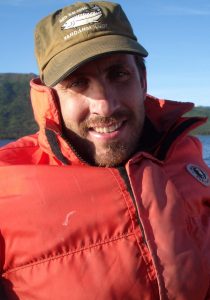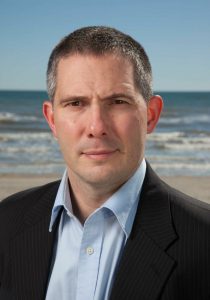Sarah Chasis
 Sarah Chasis is Senior Director for Oceans at the Natural Resources Defense Council, an international environmental organization. Her work has been wide-ranging. She has worked to strengthen coastal zone management and oil spill prevention programs, create marine protected areas and promote sustainable fisheries management. She was active in the negotiations leading up to the adoption of the UN Fish Stocks Agreement and also worked to strengthen and promote the effective implementation of the conservation provisions of the U.S. fisheries law, the Magnuson-Stevens Fishery Conservation and Management Act. More recently, she has done work in China to support sustainable fisheries management. In recognition of her work, Ms. Chasis was selected as the first Coastal Steward of the Year by the National Oceanic and Atmospheric Administration. She has participated in a wide variety of commissions including serving on the Marine Board of the National Research Council and served for many years as an Adjunct Professor of Clinical Law at the New York University School of Law. She is a graduate of Smith College and the New York University School of Law.
Sarah Chasis is Senior Director for Oceans at the Natural Resources Defense Council, an international environmental organization. Her work has been wide-ranging. She has worked to strengthen coastal zone management and oil spill prevention programs, create marine protected areas and promote sustainable fisheries management. She was active in the negotiations leading up to the adoption of the UN Fish Stocks Agreement and also worked to strengthen and promote the effective implementation of the conservation provisions of the U.S. fisheries law, the Magnuson-Stevens Fishery Conservation and Management Act. More recently, she has done work in China to support sustainable fisheries management. In recognition of her work, Ms. Chasis was selected as the first Coastal Steward of the Year by the National Oceanic and Atmospheric Administration. She has participated in a wide variety of commissions including serving on the Marine Board of the National Research Council and served for many years as an Adjunct Professor of Clinical Law at the New York University School of Law. She is a graduate of Smith College and the New York University School of Law.
Yong Chen
 Dr. Yong Chen is a Professor of Fisheries Science in the School of Marine Sciences at the University of Maine in Orono, Maine, U.S.A. He received his PhD in Zoology (Fish Population Dynamics with a minor in statistics) in 1995 from the University of Toronto in Canada. He started his career as a fisheries stock assessment scientist in the New South Wales Fisheries Department in Sydney, Australia. He moved to the University of Maine in 2000. Dr. Chen’s research focuses primarily on fisheries population dynamics and stock assessment, fisheries management, monitoring program design and optimization, fisheries ecology, statistical modeling and computer simulations. Dr. Chen is actively involved in community and professional service. He is currently a member of the United States New England Fisheries Management Council’s Scientific and Statistical Committee. He is the Editor-in-Chief of the Canadian Journal of Fisheries and Aquatic Sciences and Aquaculture and Fisheries.
Dr. Yong Chen is a Professor of Fisheries Science in the School of Marine Sciences at the University of Maine in Orono, Maine, U.S.A. He received his PhD in Zoology (Fish Population Dynamics with a minor in statistics) in 1995 from the University of Toronto in Canada. He started his career as a fisheries stock assessment scientist in the New South Wales Fisheries Department in Sydney, Australia. He moved to the University of Maine in 2000. Dr. Chen’s research focuses primarily on fisheries population dynamics and stock assessment, fisheries management, monitoring program design and optimization, fisheries ecology, statistical modeling and computer simulations. Dr. Chen is actively involved in community and professional service. He is currently a member of the United States New England Fisheries Management Council’s Scientific and Statistical Committee. He is the Editor-in-Chief of the Canadian Journal of Fisheries and Aquatic Sciences and Aquaculture and Fisheries.
Christopher Costello
 Dr. Christopher Costello is a professor of Environmental and Resource Economics at the University of California, Santa Barbara, USA, co-director of the Sustainable Fisheries Group, director of then Environmental Markets Solutions Lab, and a Research Associate with the National Bureau of Economic Research. Costello received his Ph.D from the University of California, Berkeley in 2000 and conducts research on natural resource economics and policy concerning property rights, with a focus on decision making under uncertainty, information, asset values, and natural resource scarcity. His work combines theoretical micro-economics with modeling and empirical analysis, often to inform policy on fisheries management, biological diversity, introduced species, industrial regulation, or marine policy. Costello partners with others to translate his research into on-the-ground action in several countries including Peru, Chile, Mexico, Cuba, Indonesia, China, and Cambodia. Costello is the 2016 winner of the Peter Benchley Award in Ocean Solutions.
Dr. Christopher Costello is a professor of Environmental and Resource Economics at the University of California, Santa Barbara, USA, co-director of the Sustainable Fisheries Group, director of then Environmental Markets Solutions Lab, and a Research Associate with the National Bureau of Economic Research. Costello received his Ph.D from the University of California, Berkeley in 2000 and conducts research on natural resource economics and policy concerning property rights, with a focus on decision making under uncertainty, information, asset values, and natural resource scarcity. His work combines theoretical micro-economics with modeling and empirical analysis, often to inform policy on fisheries management, biological diversity, introduced species, industrial regulation, or marine policy. Costello partners with others to translate his research into on-the-ground action in several countries including Peru, Chile, Mexico, Cuba, Indonesia, China, and Cambodia. Costello is the 2016 winner of the Peter Benchley Award in Ocean Solutions.
Ray Hilborn
 Dr. Ray Hilborn teaches graduate and undergraduate courses in food sustainability, conservation and quantitative population dynamics. He authored several books including “Overfishing: what everyone needs to know” (with Ulrike Hilborn) in 2012, “Quantitative fisheries stock assessment” with Carl Walters in 1992, and “The Ecological Detective: confronting models with data” with Marc Mangel, in 1997 and has published over 300 peer reviewed articles. He has served on the Editorial Boards of numerous journals including 7 years on the Board of Reviewing Editors of Science Magazine. He has received the Volvo Environmental Prize, the American Fisheries Societies Award of Excellence, The Ecological Society of America’s Sustainability Science Award, and the International Fisheries Science Prize. He is a Fellow of the American Fisheries Society, the Washington State Academy of Sciences, the Royal Society of Canada and the American Academy of Arts and Sciences.
Dr. Ray Hilborn teaches graduate and undergraduate courses in food sustainability, conservation and quantitative population dynamics. He authored several books including “Overfishing: what everyone needs to know” (with Ulrike Hilborn) in 2012, “Quantitative fisheries stock assessment” with Carl Walters in 1992, and “The Ecological Detective: confronting models with data” with Marc Mangel, in 1997 and has published over 300 peer reviewed articles. He has served on the Editorial Boards of numerous journals including 7 years on the Board of Reviewing Editors of Science Magazine. He has received the Volvo Environmental Prize, the American Fisheries Societies Award of Excellence, The Ecological Society of America’s Sustainability Science Award, and the International Fisheries Science Prize. He is a Fellow of the American Fisheries Society, the Washington State Academy of Sciences, the Royal Society of Canada and the American Academy of Arts and Sciences.
Jake Kritzer
 Dr. Jake Kritzer has deep expertise in fisheries science and policy, especially their intersection. He is the only representative of an environmental organization to have served on a Scientific and Statistical Committee advising a regional fishery management council in the United States, including four years as its Chair. As one of EDF’s most senior marine scientists, he has contributed to work across the globe, including fishery reform initiatives in the U.S., Cuba, Chile, Europe, and elsewhere. As Senior Director for China Fisheries, Jake is now active in building technical and management capacity, growing diverse partnerships, conducting collaborative research, and developing policy advice for the world’s most important fishing nation. Over his career, Jake’s research has had strong focus on spatial dimensions of marine ecology and management and the effects of climate change on fisheries sustainability. Prior to joining EDF in 2004, Jake earned his Ph.D. in Marine Biology from James Cook University in Australia. Jake lives in New Hampshire with his wife, Brooke, and his energetic and adorable daughter, Rosa.
Dr. Jake Kritzer has deep expertise in fisheries science and policy, especially their intersection. He is the only representative of an environmental organization to have served on a Scientific and Statistical Committee advising a regional fishery management council in the United States, including four years as its Chair. As one of EDF’s most senior marine scientists, he has contributed to work across the globe, including fishery reform initiatives in the U.S., Cuba, Chile, Europe, and elsewhere. As Senior Director for China Fisheries, Jake is now active in building technical and management capacity, growing diverse partnerships, conducting collaborative research, and developing policy advice for the world’s most important fishing nation. Over his career, Jake’s research has had strong focus on spatial dimensions of marine ecology and management and the effects of climate change on fisheries sustainability. Prior to joining EDF in 2004, Jake earned his Ph.D. in Marine Biology from James Cook University in Australia. Jake lives in New Hampshire with his wife, Brooke, and his energetic and adorable daughter, Rosa.
Tang Yi
 Dr. Tang Yi has been one of the top advisors to China’s Ministry of Agriculture (MOA) on fisheries policy. He has conducted field research and fishing operation on the sea with distant-water fisheries for 4 years. He also helped to draft the Program of Action on the Conservation of Living Aquatic Resources of China, which was promulgated by the State Council of China in 2006. Since 2010, Tang Yi has undertaken more than 20 research projects for MOA, covering a range of important topics, including fishing capacity control, fishing permit system, Total Allowable Catch system (TACs), and small scale fisheries managment. Many of his research results have been integrated into China’s fisheries policy reform. Tang Yi is now a key advocate of amending China’s Fisheries Law and the Regulations on Fishing Licensing in order to strengthen the laws’ effectiveness in sustainable fisheries. In addition to helping advance national policies, he also helps promote local policy development. He has drafted China’s first local regulation on national Marine Protected Areas (MPA) in Zhoushan, a coastal city in Zhejiang Province.
Dr. Tang Yi has been one of the top advisors to China’s Ministry of Agriculture (MOA) on fisheries policy. He has conducted field research and fishing operation on the sea with distant-water fisheries for 4 years. He also helped to draft the Program of Action on the Conservation of Living Aquatic Resources of China, which was promulgated by the State Council of China in 2006. Since 2010, Tang Yi has undertaken more than 20 research projects for MOA, covering a range of important topics, including fishing capacity control, fishing permit system, Total Allowable Catch system (TACs), and small scale fisheries managment. Many of his research results have been integrated into China’s fisheries policy reform. Tang Yi is now a key advocate of amending China’s Fisheries Law and the Regulations on Fishing Licensing in order to strengthen the laws’ effectiveness in sustainable fisheries. In addition to helping advance national policies, he also helps promote local policy development. He has drafted China’s first local regulation on national Marine Protected Areas (MPA) in Zhoushan, a coastal city in Zhejiang Province.
Walter Reid
 Dr. Walter Reid is Director of the Conservation and Science Program at the David and Lucile Packard Foundation. Previously, during 2005-2006, he was a Professor with the Woods Institute at Stanford University. From 1998 to 2005, Dr. Reid created and then was the Director of the Millennium Ecosystem Assessment. From 1992 to 1998, Dr. Reid was Vice President of the World Resources Institute in Washington D.C. From 1988 to 1992 he was a Senior Associate at WRI. Dr. Reid earned his Ph.D. in Zoology (Ecology and Evolutionary Biology) from the University of Washington in 1987 and his B.A. in Zoology from the University of California at Berkeley in 1978.
Dr. Walter Reid is Director of the Conservation and Science Program at the David and Lucile Packard Foundation. Previously, during 2005-2006, he was a Professor with the Woods Institute at Stanford University. From 1998 to 2005, Dr. Reid created and then was the Director of the Millennium Ecosystem Assessment. From 1992 to 1998, Dr. Reid was Vice President of the World Resources Institute in Washington D.C. From 1988 to 1992 he was a Senior Associate at WRI. Dr. Reid earned his Ph.D. in Zoology (Ecology and Evolutionary Biology) from the University of Washington in 1987 and his B.A. in Zoology from the University of California at Berkeley in 1978.
Zhu Wenbin
 Dr. Zhu Wenbin serves as the senior engineer and deputy director of the Department of Fishery Resources and Ecology in the Marine Fisheries Research Institute of Zhejiang, China. Zhu Wenbin is also the deputy leader of Zhejiang Dynamic Fishery Resources Monitoring Station for the East China Sea under China’s Ministry of Agriculture. Zhu Wenbin conducts research mainly in the East China Sea. His research interests include the monitoring and assessment of marine fishery resources, coastal fishery resources management, responsible marine fishing technology and fishing gear selection, exploratory ocean fishing and fishing technology, pelagic fishing development strategies, and more. Recently, Zhu Wenbin has led studies on monitoring and assessment of fishery resources in Zhejiang’s fishing grounds, where he helped to implement one of the first fishery quota management trials in China. Today, Zhu Wenbin continues to help China improve information acquisition on fisheries catch as well as promote strategy development on introducing key technologies used in pelagic fishing.
Dr. Zhu Wenbin serves as the senior engineer and deputy director of the Department of Fishery Resources and Ecology in the Marine Fisheries Research Institute of Zhejiang, China. Zhu Wenbin is also the deputy leader of Zhejiang Dynamic Fishery Resources Monitoring Station for the East China Sea under China’s Ministry of Agriculture. Zhu Wenbin conducts research mainly in the East China Sea. His research interests include the monitoring and assessment of marine fishery resources, coastal fishery resources management, responsible marine fishing technology and fishing gear selection, exploratory ocean fishing and fishing technology, pelagic fishing development strategies, and more. Recently, Zhu Wenbin has led studies on monitoring and assessment of fishery resources in Zhejiang’s fishing grounds, where he helped to implement one of the first fishery quota management trials in China. Today, Zhu Wenbin continues to help China improve information acquisition on fisheries catch as well as promote strategy development on introducing key technologies used in pelagic fishing.

